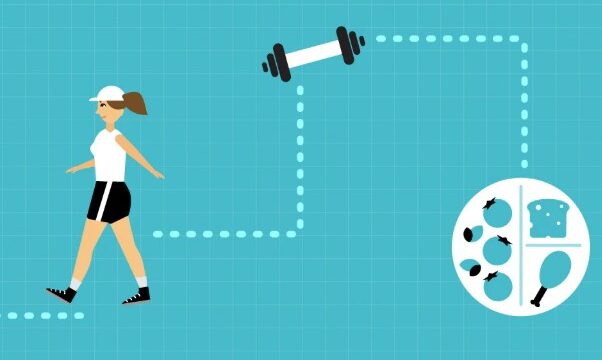Building strength is not only about lifting heavy weights or following intense training plans.
It is about developing habits that keep your body and mind strong throughout daily life.
Everyday fitness goals are small, steady steps that make a big difference over time.
They help you stay consistent, confident, and healthy while fitting naturally into your routine. By focusing on approachable goals that you can practice every day, you create a lifestyle that supports lasting strength and balance. True strength comes from consistency. When you include small movements in your day, they build up and create powerful results. You do not need hours at the gym or complex routines to stay strong. Instead, you can focus on achievable daily actions such as stretching, walking, or mindful breathing. These simple practices improve circulation, posture, and energy levels. Everyday fitness goals work best when they are realistic, enjoyable, and suited to your personal lifestyle. The first step toward everyday strength is movement. The human body is designed to move regularly, and even short periods of activity make a difference. You can begin by setting a goal to move a little every day—whether it’s walking during breaks, doing gentle yoga, or standing and stretching after sitting for long periods. Small habits like these reduce stiffness, support muscle tone, and keep your body active without requiring long workouts. Over time, these moments of movement add up to meaningful progress. It also helps to build strength through mindful exercise. This means paying attention to how your body feels while you move. Whether you are holding a plank, climbing stairs, or doing bodyweight exercises, focus on your breathing and posture. When you move with awareness, you activate your muscles more effectively and reduce the risk of injury. Mindful movement also strengthens your connection to your body, helping you notice progress in flexibility, balance, and endurance. Setting gentle but specific goals keeps your motivation steady. For example, you might decide to take a brisk ten-minute walk each morning, stretch for five minutes before bed, or complete a few squats while waiting for your coffee to brew. These actions may seem small, but they train your muscles, improve mobility, and boost your energy. Consistency is more important than intensity. When you practice these mini goals daily, your body becomes stronger and more resilient without feeling strained. Strength is not only physical—it is also mental. Everyday fitness goals help you strengthen your mindset by encouraging discipline, patience, and confidence. Each time you complete a goal, you reinforce your ability to stay committed. Even on days when motivation feels low, showing up for yourself in small ways keeps your confidence growing. This mindset can extend into other parts of life, helping you stay focused and positive in your daily responsibilities. Nutrition plays an important role in building strength as well. Your body needs nourishment to recover and grow. Setting small, manageable goals around eating habits can make a big difference. You can aim to drink enough water, include more fruits and vegetables in your meals, or plan balanced snacks to support your energy. When your body receives the right fuel, your muscles recover faster, and your endurance improves. Healthy eating is an essential partner to your daily movement goals. Rest and recovery are also vital parts of staying strong. It is easy to believe that working out constantly brings better results, but the body needs time to rebuild and recharge. You can set a daily goal to get enough sleep, stretch before bed, or practice a short relaxation exercise. These habits help reduce fatigue, prevent soreness, and promote a balanced fitness routine. Strength grows during recovery as much as it does during activity. Another simple but powerful everyday goal is to maintain good posture. Sitting or standing tall supports your back muscles and core strength. You can remind yourself to adjust your posture throughout the day, especially if you work at a desk. This small habit not only prevents discomfort but also boosts confidence and breathing efficiency. A strong posture reflects a strong body and mind working together in harmony. You can also set goals that involve functional strength—movements that make daily activities easier. Carrying groceries, climbing stairs, or lifting light household items can all serve as opportunities to build practical strength. When you approach daily tasks with awareness and good form, you naturally improve coordination and endurance. These moments of movement throughout the day can keep your body capable and adaptable. Flexibility is another essential element of everyday strength. Gentle stretching not only helps your muscles stay supple but also supports balance and stability. You can make stretching a goal before or after your main activities. This improves blood flow, reduces muscle tension, and enhances range of motion. A flexible body moves with ease and recovers more quickly from effort, making flexibility a key component of lasting strength. To stay consistent, it helps to track your small wins. You might keep a journal or simply take a moment each day to notice how your body feels. Maybe your breathing feels steadier, or you can complete movements that once felt challenging. Recognizing progress strengthens your motivation and reminds you that success comes from persistence, not perfection. Reflection turns your daily routine into a source of inspiration. A positive mindset is the foundation of every strong routine. It is important to treat your fitness journey with kindness rather than pressure. Not every day will go perfectly, and that is part of the process. When you approach your goals with patience, you create a healthier relationship with exercise. Encouraging self-talk and gratitude for what your body can do will help you stay committed and confident. If you enjoy social connection, setting shared goals with a friend or family member can make your journey even more motivating. You can take walks together, join an online class, or share updates about your progress. Encouragement and accountability help you stay consistent, and celebrating each other’s achievements makes the process more rewarding. A shared fitness journey builds not only physical strength but also emotional connection. Balance is key when maintaining everyday fitness goals. Strength does not mean constant effort; it means harmony between movement, rest, and self-care. You might find some days more active and others more restful. Both are valuable. The goal is to listen to your body and adjust as needed. Over time, this balance helps you avoid burnout and sustain long-term progress. It is also important to celebrate your body’s abilities at every stage. Strength looks different for everyone. Whether you are lifting heavier, walking longer, or simply feeling more energized, every improvement matters. When you appreciate your growth, you reinforce a positive mindset that keeps you engaged and grateful. Strength is not only measured by performance—it is measured by how empowered you feel in your body. Everyday fitness goals remind you that strength is built through simple, consistent effort. The power of small actions creates a strong foundation for health and happiness. When you commit to gentle, achievable goals, you give yourself the freedom to enjoy movement and appreciate progress. You build not just physical endurance but also resilience, confidence, and peace of mind. In the end, staying strong does not require dramatic changes or strict rules. It is about showing up each day with intention and care. By focusing on daily actions that support your well-being—moving mindfully, eating well, resting, and staying positive—you create a lifestyle that keeps you strong in every sense. These everyday fitness goals are not just habits; they are choices that honor your body and make your journey rewarding, balanced, and full of lasting strength.






